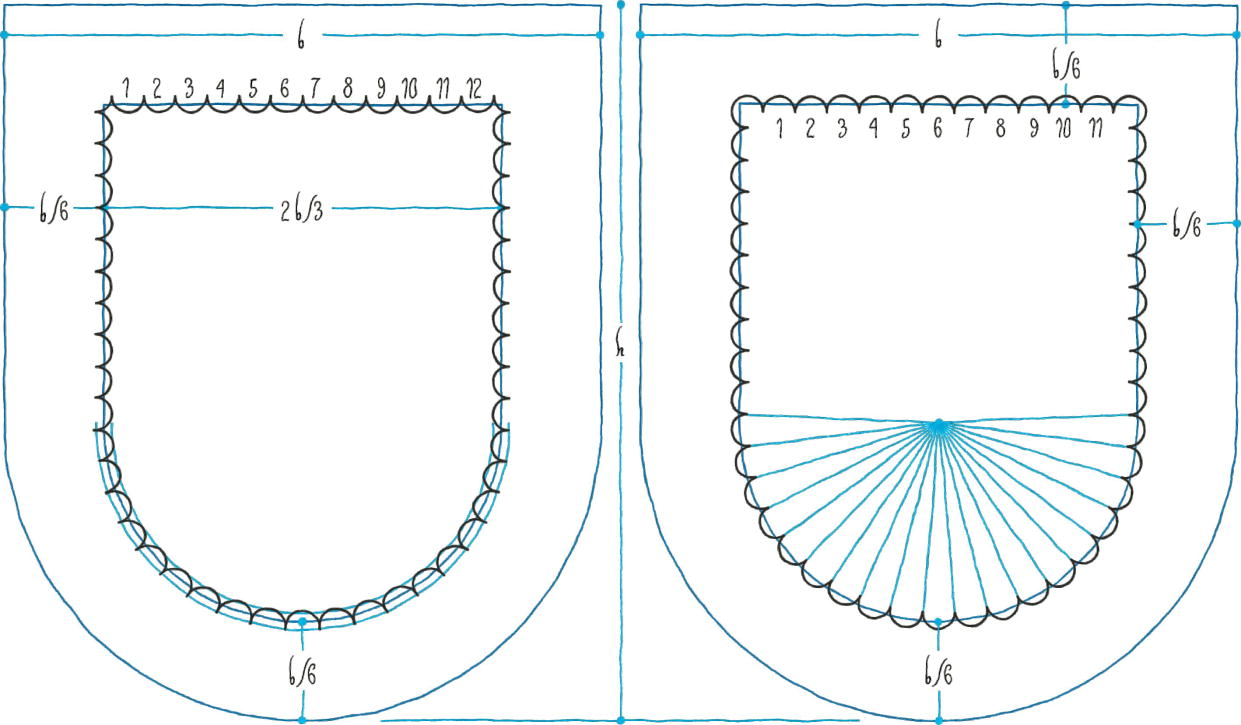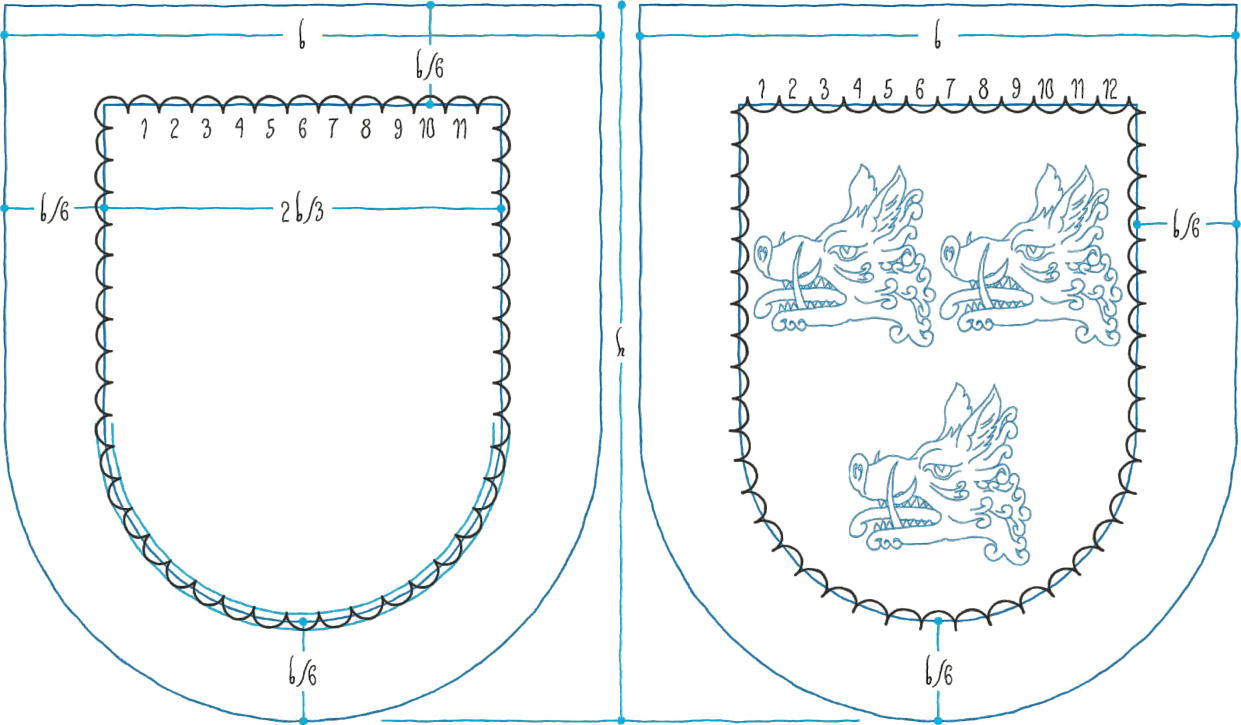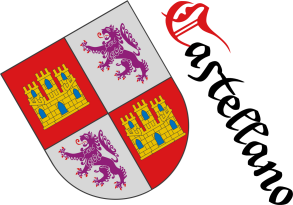
![Ver [Stych, F. S.; 1722] en referencias bibliográficas. Libro abierto, hojas de plata, filo de oro, guardas de gules, tapas de sable.](../css/Libro.Bibliografia.png)
Stych, F. S.; 1722
F. S. Stych, University of Sheffield, «The Flow Chart Method and Heraldic Enquiries» RQ, volume 6, number 4, pages 169-174, published by American Library Association, Chicago, summer of 1967.
This article describes, using a flowchart, a method to identify the holder of a coat of arms. This method is applicable to the armories of the United Kingdom, as it follows their heraldic norms and most important sources. One of the target readers of the article are librarians who, finding coats of arms in books, plates, ex libris, etc., need to classify them.
The most notable aspect of the article is the 1967 flowchart, which is shown in the image above. This image has been extracted, cleaned, and enhanced from the original diagram contained at the end of the article. Note that some functions appear repeated within the scheme, such as, «Check families listed in Anson, etc. in Burke's General Armory. Arms found?» which, in turn, is represented with a task rectangle, when it really is a rectangle containing a question, a bifurcation, which should be a diamond «Arms found?», that is, it has been represented by a rectangle what should have been represented by a rectangle and a diamond. This same issue occurs in other processes and is probably due to not complicating the flowchart further.
Bibliographical reference of century XVIII.
Classification: English language.
The author is Stych, F. S..


Copyright
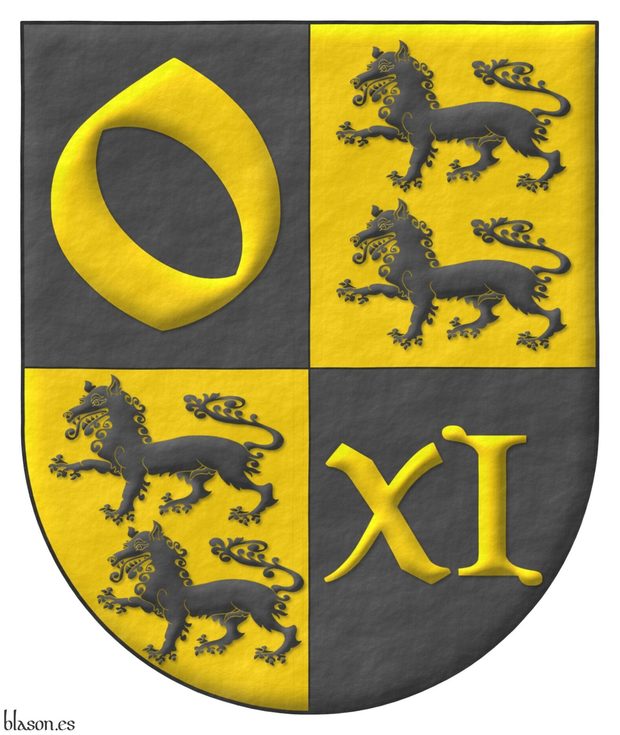
Dr. A. Salmerón
The copyright of the images, drawings, compositions or accompanying texts displayed on this site Blason.es, or in its associated heraldry domains, and which are the product of the creation of new coats of arms or the interpretation of already existing coats of arms corresponds to its author Antonio Salmerón Cabañas who is, in turn, the proprietor Blason.es.
The copyright of each work is protected by its corresponding registration of intellectual property. Antonio Salmerón Cabañas is also the author of propiedad intelectual.
Antonio Salmerón Cabañas is also the author of:
- the design of this website,
- of the images that decorate it,
- of the source code in the HTML, Tol and Javascript languages that materialize it,
- of his personal signs, his pseudonym without anonymity and the «taglines» of Blason.es,
- documents in PDF, photographic or video formats and
- owner of the trademark «Chinapieria», [Salmerón Cabañas, A.; 2009], to the which is referenced in some articles of Blason.es,
all of which is protected and protected by the laws of intellectual and industrial property.
It is not allowed to copy, use or reproduce these images, drawings, compositions or texts without the express authorization of the author and, more importantly, always respecting the rights of the holders of the coats and blasons as specified in the article called ownership of blazons and coats of arms.
Kevin McLeod's music
Kevin MacLeod (Incompetech.com) is the author of the musical compositions of some videos. He has the generosity to license it through «Creative Commons: By Attribution 3.0» (CreativeCommons.org/licenses/by/3.0/) and both here and in the credits of all these videos this generosity is attributed. Although this license permits modification of the work, these soundtracks are the originals of Kevin MacLeod.
Fonts by Pia Frauss
The wonderful fonts shown in Blason.es and some of its documents in PDF format have the rights of Dr. Marianne Steinbauer (Pia-Frauss.de) who personally authorized me to use them, from here my most sincere gratitude.
Historical documents
They can also be found in Blason.es and in its associated heraldry domains images and compositions that contain parts or clippings of armorials, heraldic books, or heraldic pieces with centuries of antiquity and, therefore, already in public domain.
Credits of the articles
In addition to the copyrights mentioned in the previous sections, The following list shows the credits of the coats of arms, photographs or other heraldic objects that appear in some articles of Blason.es.
Although this list does not intend to be exhaustive, I try to maintain it the most updated and complete as possible and I will be happy to make the inclusions or appropriate modifications that are communicated to me.
- Stephan Urs Breu is the designer of the coat of arms in: The coat of arms of Alena Rehberger in 3 steps, Coat of arms of Alena Rehberger, Rehberger, Alena, Alena Rehberger, Crest of Alena Rehberger, Crest and motto of Alena Rehberger and Commoners' certification for Alena Rehberger.
- Rudolf Juchter van Bergen Quast is the designer of the coat of arms in: Dubai Office of the European Chamber of Digital Commerce.
- Juan Lanzagorta Vallin is the designer of the coat of arms in: Francisca Aras Quirce, Aras Quirce, Manuel Maria, Sister Esperanza Vega Lanzagorta, schema 2x5, Sister Esperanza Vega Lanzagorta, schema 2x2, Sister Esperanza Vega Lanzagorta, outlined, Sister Esperanza Vega Lanzagorta, plain tincture, Vega Lanzagorta, Sister Esperanza, Ixai Lanzagorta Ochoa, schema 1x3, Ixai Lanzagorta Ochoa, schema 2x2, Lanzagorta Ochoa, Ixai, Ixai Lanzagorta Ochoa, plain tincture, Juan Lanzagorta Vallín, schema 1x3, Juan Lanzagorta Vallín, outlined, Juan Lanzagorta Vallín, plain tincture, Lanzagorta Vallín, Juan, Juan Lanzagorta Vallín and Motto around the shield of Juan Lanzagorta Vallín.
- Randy Potts is the designer of the coat of arms in: Lasco, Ryker Scott, Commoners' certification for Ryker Scott Lasco, Lasco, Hudson Hayes, Commoners' certification for Hudson Hayes Lasco, Jones, Easton Michael, Commoners' certification for Easton Michael Jones, Jones, Rhettlee Cooper, Commoners' certification for Rhettlee Cooper Jones, Botkin, Bradlee Tatym LaRue, Crest of Bradlee Tatym LaRue Botkin, Commoners' certification for Bradlee Tatym LaRue Botkin, McCoy, Evander Graham Wylder, Commoners' certification for Evander Graham Wylder McCoy, McCoy, Sebastian Artemis Cole, Commoners' certification for Sebastian Artemis Cole McCoy, Lasco, Corey Scott, Commoners' certification for Corey Scott Lasco, Robidoux, Makayla Danée, Crest of Makayla Danée Robidoux, Commoners' certification for Makayla Danée Robidoux, Potts, Tiana Rose Lee, Crest of Tiana Rose Lee Potts, Commoners' certification for Tiana Rose Lee Potts, Potts, Konstånz Chantal Leóné, Crest of Konstånz Chantal Leóné Potts, Commoners' certification for Konstånz Chantal Leóné Potts, Potts, Köryn Alexandria Konstånz, Crest of Köryn Alexandria Konstånz Potts, Commoners' certification for Köryn Alexandria Konstånz Potts, McCoy, Britania Anastoshia Korÿn, Commoners' certification for Britania Anastoshia Korÿn McCoy, Potts of Wentworth, House of, Commoners' certification designed by Randy David Lee Xavier House of Potts of Wentworth, Genealogical chart of the House of Potts of Wentworth, Potts, Randy David Lee Xavier, Crest, mantling and motto of Randy David Lee Xavier Potts, Standard Randy David Lee Xavier Potts and Full achievement of Randy David Lee Xavier Potts.
- Rolando Yñigo-Genio is the designer of the coat of arms in: Motto of Rolando Yñigo-Genio, ISCH Certification for Rolando Yñigo-Genio, Yñigo-Genio, Elias, Coat of arms of Elias Yñigo-Genio, Yñigo-Genio, Noelia, Coat of arms of Noelia Yñigo-Genio, Yñigo-Genio, Rolando and Coat of arms of Rolando Yñigo-Genio.
- Alfonso de Ceballos-Escalera y Gila is the author of the certification of arms in: Carlos Vidriales, certification, cover and page 6, Carlos Vidriales, certification, pages 3 and 6, Carlos Vidriales, certification, pages 6 and 7 and Carlos Vidriales, certification, 8 pages.
- Andreu Alfaro is the author of the sculpture in: Location map.
- Carlos Vidriales commissioned this wax seal from my interpretation of his arms in: Carlos Vidriales, seal and sealing wax.
- Dr. Marianne Steinbauer has the copyright of the font in: o-XI, video of the construction of the coat of arms.
- Dr.a Marianne Steinbauer tiene los derechos del tipo de letra in: Enrique Fernández Marqués, heraldic catalog, Enrique Fernández Marqués, video of the heraldic catalog, ANPC, video of the blazon, ANPC, heraldic catalog of 6 pieces, ANPC, video of the heraldic catalog, Martos García, J. C., video of the blazon, Martos García, J. C., heraldic catalogue and Martos García, J. C., video of the heraldic catalogue.
- Edward Auer piano performance in: B. Quesada, video of the blazon.
- Ernesto Juan Anaya is the designer of the coat of arms in: Lucca de Anaya, Nilda Ernestina, Nilda Ernestina Lucca de Anaya, Reverend Nilda Ernestina Lucca de Anaya, Galero and motto of Nilda Ernestina Lucca de Anaya and Nilda E. Lucca de Anaya in the book International Register of Arms, Volume 4.
- Felipe Trujillo Jiménez is the designer of the coat of arms in: Pons Paneque, Jonathan, Jonathan Pons Paneque, Arjona Berrocal, Rubén and Rubén Arjona Berrocal.
- Fernando Martínez Larrañaga is the designer of the coat of arms in: Trujillo Jiménez, Hermanos and Hermanos Trujillo Jiménez.
- Kevin MacLeod es el autor de la música in: ANPC, video of the blazon, ANPC, video of the heraldic catalog, Martos García, J. C., video of the blazon, Martos García, J. C., video of the heraldic catalogue and Video, drawing a helm.
- Kevin MacLeod is the author of the music in: o-XI, video of the heraldic starmap and o-XI, video of the construction of the coat of arms.
- Pablo Plaza is the author of the photograph in: Carlos Vidriales, his arms in my Exhibition at the International Lab and Carlos Vidriales, his arms in my Lecture at the International Lab.
- Paul Rosenthal violin performance in: B. Quesada, video of the blazon.
- Ron Cobb is the designer of the original starship in: o-XI, video of the heraldic starmap.
- SkyL.designer in: Sparkles, Marie Unicorn, Marie Unicorn Sparkles, Crest of Marie Unicorn Sparkles, Crest and motto of Marie Unicorn Sparkles and Commoners' certification for Marie Unicorn Sparkles.
- This book belongs to the Biblioteca Nacional de España. License Creative Commons CC-BY. You may share, transform and create from images in the public domain that are accessible in the Hispanic Digital Library in: Tejero de Rojas y Sandoval, J. F.; XVII, Pérez de Vargas, J.; XVI, Rodríguez de la Vega, A.; XVI and Avilés, T. de; XVI.
- Viola Viva interpretación con viola in: Enrique Fernández Marqués, video of the heraldic catalog.


![Ver [Nisbet, A.; 1722] en referencias bibliográficas. Libro abierto, hojas de plata, filo de oro, guardas de gules, tapas de sable.](../css/Libro.Bibliografia.png)
Nisbet, A.; 1722
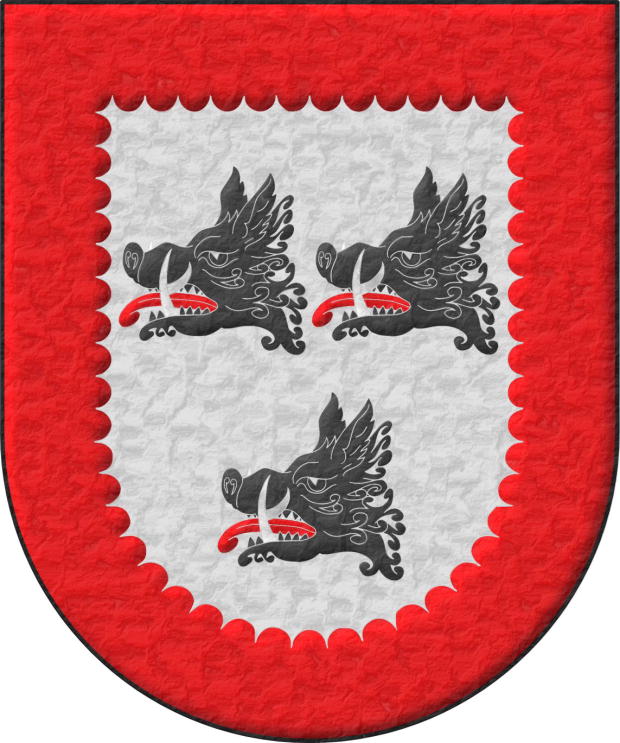
Alexander Nisbet, «System of Heraldry Speculative and Practical: With the True Art of Blazon», subtitle «according to the most approved heralds in Europe: illustrated with suitable examples of armoria figures, and achievements of the most considerable surnames and families in Scotland, together with historical and genealogical memorials relative thereto», printed by J. MackEuen, Edinburgh, 1722.
This is the very 1st edition of this book and I consult the edition [Nisbet, A.; 1816].
Bibliographical reference of century XVIII.
The author is Nisbet, Alexander.
Bibliographic reference mentioned in the following articles:
External resource:


![Ver [Nisbet, A.; 1816] en referencias bibliográficas. Libro abierto, hojas de plata, filo de oro, guardas de gules, tapas de sable.](../css/Libro.Bibliografia.png)
Nisbet, A.; 1816
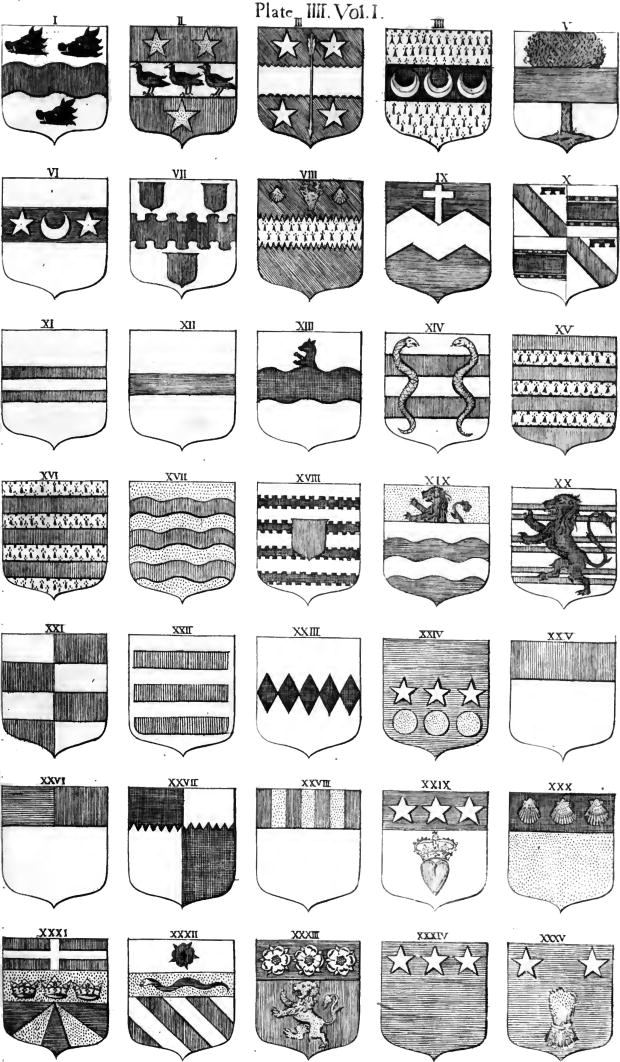
Alexander Nisbet, «System of Heraldry Speculative and Practical: With the True Art of Blazon», subtitle «according to the most approved heralds in Europe: illustrated with suitable examples of armoria figures, and achievements of the most considerable surnames and families in Scotland, together with historical and genealogical memorials relative thereto», printed by William Blackwood de Ediburgo and Rodwell and Martin of London, Edinburgh, 1816.
This is the edition I consult and the 1st edition of this book is [Nisbet, A.; 1722].
The illustration accompanying this bibliographic reference corresponds to page 43 of this edition of 1816.
Bibliographical reference of century XIX.
The author is Nisbet, Alexander.
Here are the articles quoting this reference:
External resources:
Internal resources: NisbetA1722.SystemHeraldry.pdf.


Alexander Nisbet, schema
Bordure engrailed and bordure invected.
Painting inspired in [Nisbet, A.; 1816; page 21, pictures 1 and 2], but with the 3 boar's heads of Alexander Nisbet within the 2nd bordure invected.
Blazon writen by the College of Arms for the coat of arms of Michael John Huxley-Evans «Per fess nebuly Sable and Ermine in chief a Rose Argent barbed and seeded proper within a wreath of Thorns Or in base three Boar's Heads erased Sable armed Or.», but to differentiate from the «armed» of the claws, I prefer «tusked» to «armed» for the defenses/tusks of the boar's heads.
Blazon keywords: Bordure, Invected, Engrailed, Head and Boar.
Style keywords: Semi-circular.
Classification: Schema.
Bearer: Nisbet, Alexander.


![Ver [Shakespeare, W.; 1608] en referencias bibliográficas. Libro abierto, hojas de plata, filo de oro, guardas de gules, tapas de sable.](../css/Libro.Bibliografia.png)
Shakespeare, W.; 1608
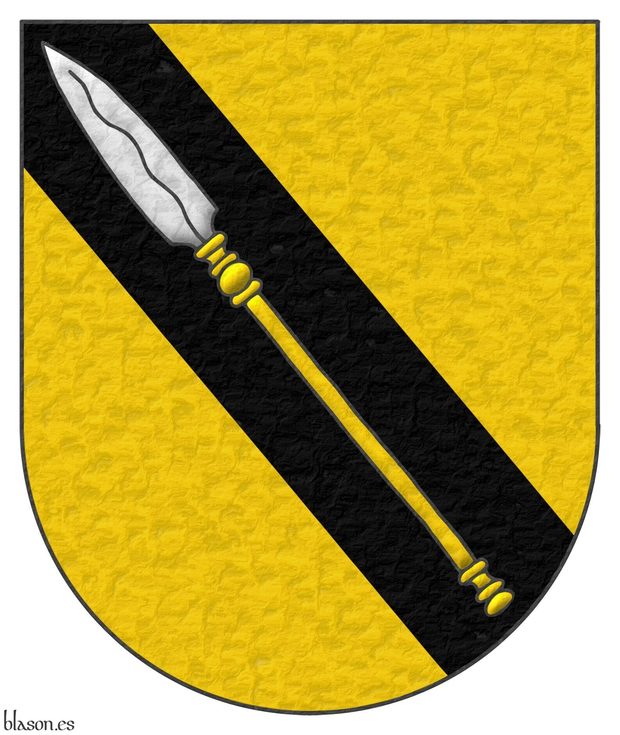
William Shakespeare, «Coriolanus», Tragedy in 5 acts and 29 scenes, written in verse, dated to either 1608 or 1609, depending on the sources.
It is one of the last works written by William Shakespeare, a tragedy based on the life of Caius Marcius Coriolanus, a legendary Roman general from the 5th century B.C. Some authors consider General Coriolanus to be a historical figure, while others do not.
Initially known only as Caius Marcius, during the war against the Volsci he becomes a hero by entering the city of Corioli with a few soldiers, and from then on, he is called Caius Marcius Coriolanus.
Act 3, Scene 2, Volumnia, mother of Coriolanus
I prithee now, my son,
Go to them, with this bonnet in thy hand;
And thus far having stretch'd it (here be with them)
Thy knee bussing the stones (for in such business
Action is eloquence, and the eyes of the ignorant
More learned than the ears) waving thy head,
Which often, thus, correcting thy stout heart,
Now humble as the ripest mulberry
That will not hold the handling: or say to them,
Thou art their soldier, and being bred in broils
Hast not the soft way which, thou dost confess,
Were fit for thee to use as they to claim,
In asking their good loves, but thou wilt frame
Thyself, forsooth, hereafter theirs, so far
As thou hast power and person.
Bibliographical reference of century XVII.
Author: Shakespeare, William.
External resource:


![Ver [St. George's Roll; 1285] en referencias bibliográficas. Libro abierto, hojas de plata, filo de oro, guardas de gules, tapas de sable.](../css/Libro.Bibliografia.png)
St. George's Roll; 1285
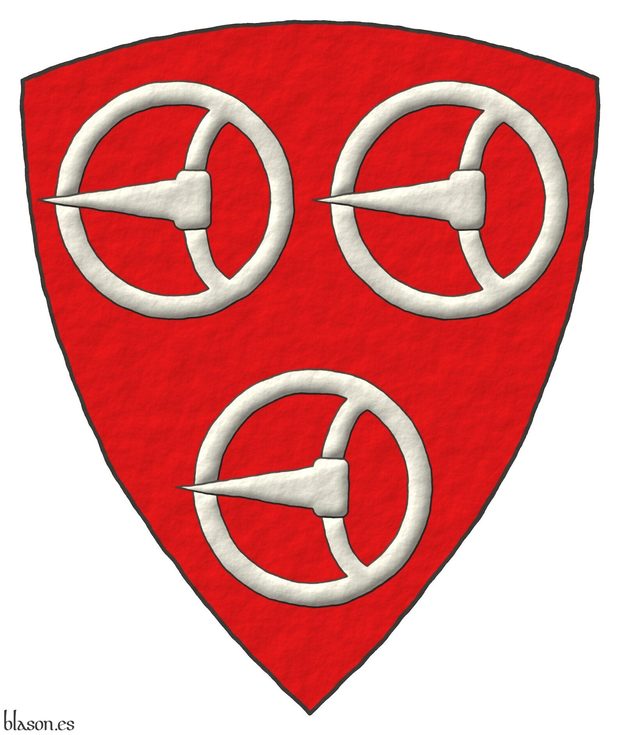
St. George's Roll, in English usually written as «MS Vincent, 164 ff.1-21b», also called [Vincent, MS; 1285], it is in the College of Arms, London, containing 677 painted coats of arms, it is an English roll or arms dating from c. 1285.
The bibliographical reference that I mainly use for this armorial is [Vincent, MS; 1285].
Bibliographical reference of century XIII.
Classification: Armorial roll and Manuscript.
The author is anonymous.
Bibliographic reference mentioned in the following articles:
- Adam de Cretingges
- Bartholomew de Yattendon
- Brian Timms
- Edmund de Bassingburnn
- Howel ap Res
- James de Sottone, le Fitz
- Joan de Okinton
- John de Beauchamp
- John de Ladbrooke
- John le Sturmy
- Nicholas Malmains
- Norman Darcy
- Ricardo de Mandeville
- Robert de Malet
- Simon de Crombe
- Simon de Ver
- Simon le FizSimon
- Thomas Roscelyn
- Thomas de Werblintone
- Thomas le FizThomas
- Vincent, MS; 1285
- Warbrentone, Thomas de
- William Bardolf
- William de Ferrers, Earl of Derby
- William de Hondeshacre

Continue with: Heralds International.
-
Language
-
Categories of heraldry
-
Divisions of the field
- Without divisions
- Party per pale
- Party per fess
- Party per bend
- Party per bend sinister
- Tierce
- Tierce sinister
- Tierced per pale
- Tierced per fess
- Tierced per bend
- Tierced pallwise inverted
- Quarterly
- Quarterly per saltire
- Gyronny
- Party per fess, the chief per pale
- Party per pale, the sinister per fess
- Party per fess, the base per pale
- Party per pale, the dexter per fess
- Chapé
- Chaussé
- Embrassé
- Contre-embrassé
- Party per chevron
- Enté
- Enté en point
- Flanched
-
Metals
-
Colours
-
Furs
-
Other tinctures
-
Ordinaries and sub-ordinaries
-
Diminutives of the ordinaries
-
Geometric charges
-
Composite ordinaries
-
Inanimate charges from Nature
Atom, Crescent, Diamond, Emerald, Estoile, Increscent, Lightning flash, Moon, Mount, Mullet, Mullet of four points, Orbital, Plough of Ursa Major, Rainbow, Ray of the sun, River, Sea, Snowflake, Sun, Sun in splendour, Sun of May, Terrestrial globe, Trimount, Water and Wave.
-
Vegetal charges from Nature
Acorn, Apple, Apple tree, Ash, Bluebonnet, Camellia, Chrysanthemum, Cinquefoil, Cornflower, Dogwood flower, Double rose, Eguzki-lore, Elm, Fleur de lis, Flower, Gourd, Holm oak, Hop cone, Indian paintbrush, Kapok tree, Laurel, Lily, Linden, Lotus flower, Madonna lily, Mexican cedar tree, Oak, Olive tree, Palm tree, Plantain plant, Pomegranate, Poplar leaf, Rose, Shamrock, Sunflower, Thistle, Tree, Tulip, Vine and Wheat.
-
Animal charges from Nature
Badger, Bald eagle, Barbel, Barn owl, Bear, Beaver, Bee, Beetle, Bighorn sheep, Binson, Blackbird, Boar, Brach hound, Bull, Cow, Doe, Dog, Dolphin, Dove, Eagle, Elephant, Falcon, Female figure, Fish, Flame, Fly, Fox, Frog, Goat, Goldfinch, Goose, Heron, Horse, Hummingbird, Jaguar, Lark, Leopard, Lion, Lion passant, Lion rampant guardant, Lioness, Lynx, Male figure, Martlet, Merino ram, Owl, Panther, Parrot, Peacock, Pelican, Pelican in her piety, Pronghorn, Puffin, Quetzal, Raven, Roe deer, Rooster, Savage, Seagull, Serpent, She-wolf, Stag, Starling, Talbot, Turtle, Tyger, Vulture, Warren hound and Wolf.
-
Parts of natural charges
Arm, Beak, Branch, Caboshed, Chest, Claw, Covert, Dorsal fin, Eagle claw, Ear of wheat, Ermine spot, Escallop, Feather, Foot (palmiped), Foreleg, Forepaw, Hand, Head, Heart, Hoof, Leaf, Neck, Ostrich feather, Palm frond, Paw, Roe deers' attires, Shoulder, Sprig, Stags' attires, Stem, Swallow-tail, Tail, Tail addorsed, Tail fin, Talon, Tibia, Tooth, Trunk, Trunk (elephant), Two hands clasped, Two wings in vol, Udder, Wing and Wrist.
-
Artificial charges
Ace of spades, Anchor, Anvil, Arch, Arm vambraced, Armillary sphere, Arrow, Axe, Bell, Bell tower, Beret, Bonfire, Book, Bookmark, Bow, Branding iron, Bridge, Broken, Buckle, Cannon, Cannon dismounted, Cannon port, Canopy roof, Carbuncle, Castle, Celtic Trinity knot, Chain, Chess rooks, Church, Clarion, Clay pot, Closed book, Club, Column, Comb, Compass rose, Conductor's baton, Cord, Covered cup, Crozier, Crucible, Cuffed, Cup, Cyclamor, Dagger, Displayed scroll, Double vajra, Drum, Ecclesiastical cap, Fanon, Federschwert, Fleam, Four crescents joined millsailwise, Galician granary, Garb, Gauntlet, Geometric solid, Grenade, Halberd, Hammer, Harp, Host, Hourglass, Key, Key ward, Knight, Knot, Lantern, Letter, Line, Loincloth, Maunch, Menorah, Millrind, Millstone, Millwheel, Monstrance, Mortar, Mullet of six points pierced, Nail, Non-classic artifact, Norman ship, Number, Oar, Oil lamp, Open book, Page, Pair of pliers, Pair of scales, Parchment, Pestle, Piano, Pilgrim's staff, Plough share, Polish winged hussar, Port, Portcullis, Potent, Quill, Ribbon, Rosette of acanthus leaves, Sabre, Sackbut, Sail, Scroll, Scythe, Sheaf of tobacco, Ship, Skirt, Spear, Spear's head, Stairway, Star of David, Step, Sword, Symbol, Tetrahedron, Torch, Tower, Trident, Trumpet, Turret, Two-handed sword, Wagon-wheel, Water-bouget, Wheel, Winnowing fan and With a turret.
-
Immaterial charges
Angel, Archangel, Basilisk, Dragon, Dragon's head, Garuda, Golden fleece, Griffin, Heart enflamed, Justice, Mermaid, Our Lady of Mercy, Ouroboros, Paschal lamb, Pegasus, Phoenix, Sacred Heart of Jesus, Saint George, Sea-griffin, Sea-lion, Trinity, Triton, Unicorn, Winged hand and Wyvern.
-
External elements
-
Heraldic creations
-
References
-
Formats
-
Keywords on this page
Invected, Disclaimer, Engrailed, Armorial roll, Erased, Bend, Bibliography, Bordure, Head, Charged, Heraldry and heralds, Criterion, Tusked, Link, Schema, Gules, Heralds International, Identification, Boar, Langued, Spear, Legal notice, English language, Manuscript, Semi-circular, Nisbet, Alexander, Or, Argent, Without divisions, Bendwise, Kingdom of England, Sable, Century XIII, Century XIX, Century XVII and Century XVIII.

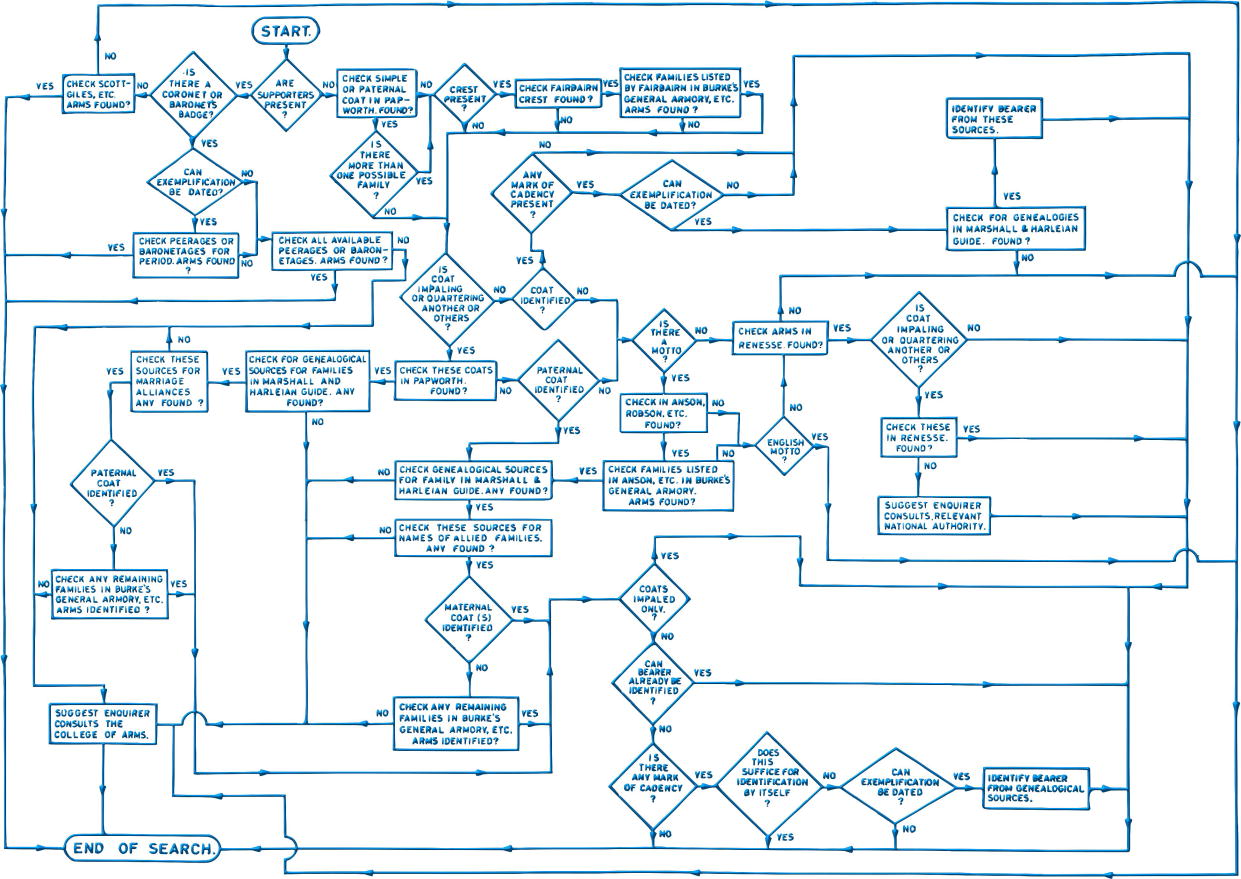
![Ver [Invected and engrailed] en criterios utilizados. Unicornio saltante sobre la divisa, criterio.](../css/Unicornio.Criterio.png)
